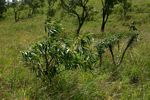| Home | > | List of locations | > | Mtoroshanga Pass, Great Dyke |
Location: Mtoroshanga Pass, Great Dyke
Photo: Bart Wursten
Two endemic species of the Gt Dyke: Ozoroa longipetiolata (left) and Euphorbia wildii (right).
General Information
Quarter degree square: 1730B1 Country: Zimbabwe Habitat: Serpentine grasslands on the northern Great Dyke. Altitude range: c.1520 m Annual rainfall: Location (short): Location (detailed): |
Description
The Great Dyke is a range of hills running north-south, almost perfectly dividing Zimbawe in two. The whole range is botanically unique, due to the mineral rich soils, particularly serpentine and chromium. It is the second most important area of endemism, after Chimanimani, with the northern Great Dyke, showing a marked botanical difference to the southern part. The Mutorashanga Pass crosses the northern Great Dyke through an area of relatively little disturbance, caused by small mining operations. The large number of endemics are all plants adapted to the otherwise hostile serpentine soils. Although very much restricted to this habitat, many, such as Ozoroa longipetiolata (Anacardiaceae), Euphorbia wildii (Euphorbiaceae) and Indigofera serpentinicola (Fabaceae), are common where they occur.
Useful links
View a list of records for Mtoroshanga Pass, Great Dyke
View a list of unique taxa (excluding cultivated plants) for Mtoroshanga Pass, Great Dyke
View a list of unique taxa (all taxa whether cultivated or not) for Mtoroshanga Pass, Great Dyke
View a list of recorders who have visited this location
| Home | > | List of locations | > | Mtoroshanga Pass, Great Dyke |

